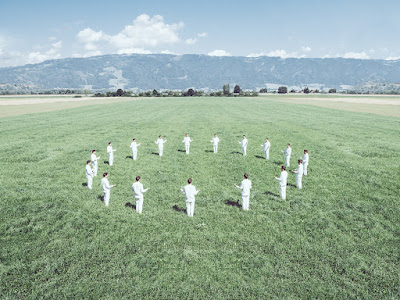ART REVIEW: Klaus Pichler's Photographs Find Human Emotion In Cultish Practice
Klaus Pichler's current exhibition at Vienna's Anzenberger Gallery, This will change your life forever, is ostensibly a record of the artist's two-year undercover stint as a member of various "new esoteric" groups, wherein he learned about--and participated in--their pseudo scientific and spiritual rituals and beliefs. Yet upon closer examination, Pichler's investigation reveals the very real human emotions behind the strange flash and dazzle of it all. On display are staged photographs and digital collages of Pichler reenacting some of these cultish practices--sitting in a homemade "orgon accumulator" meant to transfer positive energy into his body, using the cardboard cylinder from a paper towel roll to suck negative thoughts out of his own head--as well as some of the objects used in these practices, all quotidian items with supposed mystical properties all ordered online at ridiculously high markups.
Pichler walks a fine line between scientific curiosity about the utility of these rituals and gentle mockery of the blatantly consumerist aspects involved in these "esoteric" belief systems. Yet he refrains from poking outright fun at the fact that "new esoterics" sell 63-euro "worry stones," 69-euro "chemtrail detox pills," and 279-euro wooden cutting boards that claim to "delete manipulative energies"--all available to order online for the keen believer. Merely describing and displaying these artifacts is as far as Pichler goes, because his ultimate focus is on what drives individuals to subscribe to these secretive groups--the promise of finding love and leading more positive lives.
It is one key work in This will change your life forever that exemplifies the very human concerns of Pichler's findings. A pile of screen-printed pillows laid in a corner of the gallery depict a hand holding what is described as a bag of "sugar balls [...] informed with the vibrations of unconditional love" (available for purchase for 39 euro). When it comes to items that promise love and happiness versus the standard energy-field/chemtrail-repellant knickknacks, a clear emotional line has been crossed. The people who buy the former item reveal more about themselves than those who invest in the aforementioned worry stones--namely, they reveal the fundamentally lonely nature of these "new esoterics." The people who join these cults and groups hope to find love and like-minded people, and the idea of buying love in sugar ball-form is wholly derived from this simple wish. The placement of the sugar-pill pillows on the ground also emphasizes the relatable nature of the desire to be loved: it is understandable and ordinary, and so the work exploring this theme is arranged in a way that viewers are more accustomed to, rather than in the usual rarefied gallery style of a work on a wall.
Pichler walks a fine line between scientific curiosity about the utility of these rituals and gentle mockery of the blatantly consumerist aspects involved in these "esoteric" belief systems. Yet he refrains from poking outright fun at the fact that "new esoterics" sell 63-euro "worry stones," 69-euro "chemtrail detox pills," and 279-euro wooden cutting boards that claim to "delete manipulative energies"--all available to order online for the keen believer. Merely describing and displaying these artifacts is as far as Pichler goes, because his ultimate focus is on what drives individuals to subscribe to these secretive groups--the promise of finding love and leading more positive lives.
It is one key work in This will change your life forever that exemplifies the very human concerns of Pichler's findings. A pile of screen-printed pillows laid in a corner of the gallery depict a hand holding what is described as a bag of "sugar balls [...] informed with the vibrations of unconditional love" (available for purchase for 39 euro). When it comes to items that promise love and happiness versus the standard energy-field/chemtrail-repellant knickknacks, a clear emotional line has been crossed. The people who buy the former item reveal more about themselves than those who invest in the aforementioned worry stones--namely, they reveal the fundamentally lonely nature of these "new esoterics." The people who join these cults and groups hope to find love and like-minded people, and the idea of buying love in sugar ball-form is wholly derived from this simple wish. The placement of the sugar-pill pillows on the ground also emphasizes the relatable nature of the desire to be loved: it is understandable and ordinary, and so the work exploring this theme is arranged in a way that viewers are more accustomed to, rather than in the usual rarefied gallery style of a work on a wall.


Comments
Post a Comment